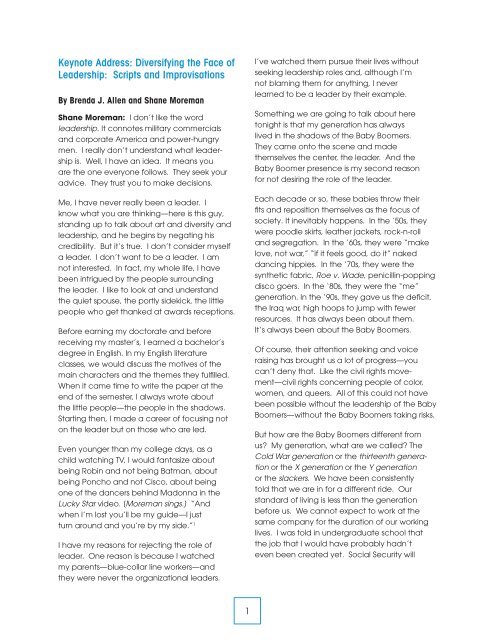The New Face of Arts Leadership in the West - westaf - The Western ...
The New Face of Arts Leadership in the West - westaf - The Western ...
The New Face of Arts Leadership in the West - westaf - The Western ...
You also want an ePaper? Increase the reach of your titles
YUMPU automatically turns print PDFs into web optimized ePapers that Google loves.
Keynote Address: Diversify<strong>in</strong>g <strong>the</strong> <strong>Face</strong> <strong>of</strong><br />
<strong>Leadership</strong>: Scripts and Improvisations<br />
By Brenda J. Allen and Shane Moreman<br />
Shane Moreman: I don’t like <strong>the</strong> word<br />
leadership. It connotes military commercials<br />
and corporate America and power-hungry<br />
men. I really don’t understand what leadership<br />
is. Well, I have an idea. It means you<br />
are <strong>the</strong> one everyone follows. <strong>The</strong>y seek your<br />
advice. <strong>The</strong>y trust you to make decisions.<br />
Me, I have never really been a leader. I<br />
know what you are th<strong>in</strong>k<strong>in</strong>g—here is this guy,<br />
stand<strong>in</strong>g up to talk about art and diversity and<br />
leadership, and he beg<strong>in</strong>s by negat<strong>in</strong>g his<br />
credibility. But it’s true. I don’t consider myself<br />
a leader. I don’t want to be a leader. I am<br />
not <strong>in</strong>terested. In fact, my whole life, I have<br />
been <strong>in</strong>trigued by <strong>the</strong> people surround<strong>in</strong>g<br />
<strong>the</strong> leader. I like to look at and understand<br />
<strong>the</strong> quiet spouse, <strong>the</strong> portly sidekick, <strong>the</strong> little<br />
people who get thanked at awards receptions.<br />
Before earn<strong>in</strong>g my doctorate and before<br />
receiv<strong>in</strong>g my master’s, I earned a bachelor’s<br />
degree <strong>in</strong> English. In my English literature<br />
classes, we would discuss <strong>the</strong> motives <strong>of</strong> <strong>the</strong><br />
ma<strong>in</strong> characters and <strong>the</strong> <strong>the</strong>mes <strong>the</strong>y fulfilled.<br />
When it came time to write <strong>the</strong> paper at <strong>the</strong><br />
end <strong>of</strong> <strong>the</strong> semester, I always wrote about<br />
<strong>the</strong> little people—<strong>the</strong> people <strong>in</strong> <strong>the</strong> shadows.<br />
Start<strong>in</strong>g <strong>the</strong>n, I made a career <strong>of</strong> focus<strong>in</strong>g not<br />
on <strong>the</strong> leader but on those who are led.<br />
Even younger than my college days, as a<br />
child watch<strong>in</strong>g TV, I would fantasize about<br />
be<strong>in</strong>g Rob<strong>in</strong> and not be<strong>in</strong>g Batman, about<br />
be<strong>in</strong>g Poncho and not Cisco, about be<strong>in</strong>g<br />
one <strong>of</strong> <strong>the</strong> dancers beh<strong>in</strong>d Madonna <strong>in</strong> <strong>the</strong><br />
Lucky Star video. [Moreman s<strong>in</strong>gs.] “And<br />
when I’m lost you’ll be my guide—I just<br />
turn around and you’re by my side.” 1<br />
I have my reasons for reject<strong>in</strong>g <strong>the</strong> role <strong>of</strong><br />
leader. One reason is because I watched<br />
my parents—blue-collar l<strong>in</strong>e workers—and<br />
<strong>the</strong>y were never <strong>the</strong> organizational leaders.<br />
I’ve watched <strong>the</strong>m pursue <strong>the</strong>ir lives without<br />
seek<strong>in</strong>g leadership roles and, although I’m<br />
not blam<strong>in</strong>g <strong>the</strong>m for anyth<strong>in</strong>g, I never<br />
learned to be a leader by <strong>the</strong>ir example.<br />
Someth<strong>in</strong>g we are go<strong>in</strong>g to talk about here<br />
tonight is that my generation has always<br />
lived <strong>in</strong> <strong>the</strong> shadows <strong>of</strong> <strong>the</strong> Baby Boomers.<br />
<strong>The</strong>y came onto <strong>the</strong> scene and made<br />
<strong>the</strong>mselves <strong>the</strong> center, <strong>the</strong> leader. And <strong>the</strong><br />
Baby Boomer presence is my second reason<br />
for not desir<strong>in</strong>g <strong>the</strong> role <strong>of</strong> <strong>the</strong> leader.<br />
Each decade or so, <strong>the</strong>se babies throw <strong>the</strong>ir<br />
fits and reposition <strong>the</strong>mselves as <strong>the</strong> focus <strong>of</strong><br />
society. It <strong>in</strong>evitably happens. In <strong>the</strong> ‘50s, <strong>the</strong>y<br />
were poodle skirts, lea<strong>the</strong>r jackets, rock-n-roll<br />
and segregation. In <strong>the</strong> ‘60s, <strong>the</strong>y were “make<br />
love, not war,” “if it feels good, do it” naked<br />
danc<strong>in</strong>g hippies. In <strong>the</strong> ‘70s, <strong>the</strong>y were <strong>the</strong><br />
syn<strong>the</strong>tic fabric, Roe v. Wade, penicill<strong>in</strong>-popp<strong>in</strong>g<br />
disco goers. In <strong>the</strong> ‘80s, <strong>the</strong>y were <strong>the</strong> “me”<br />
generation. In <strong>the</strong> ‘90s, <strong>the</strong>y gave us <strong>the</strong> deficit,<br />
<strong>the</strong> Iraq war, high hoops to jump with fewer<br />
resources. It has always been about <strong>the</strong>m.<br />
It’s always been about <strong>the</strong> Baby Boomers.<br />
Of course, <strong>the</strong>ir attention seek<strong>in</strong>g and voice<br />
rais<strong>in</strong>g has brought us a lot <strong>of</strong> progress—you<br />
can’t deny that. Like <strong>the</strong> civil rights movement—civil<br />
rights concern<strong>in</strong>g people <strong>of</strong> color,<br />
women, and queers. All <strong>of</strong> this could not have<br />
been possible without <strong>the</strong> leadership <strong>of</strong> <strong>the</strong> Baby<br />
Boomers—without <strong>the</strong> Baby Boomers tak<strong>in</strong>g risks.<br />
But how are <strong>the</strong> Baby Boomers different from<br />
us? My generation, what are we called? <strong>The</strong><br />
Cold War generation or <strong>the</strong> thirteenth generation<br />
or <strong>the</strong> X generation or <strong>the</strong> Y generation<br />
or <strong>the</strong> slackers. We have been consistently<br />
told that we are <strong>in</strong> for a different ride. Our<br />
standard <strong>of</strong> liv<strong>in</strong>g is less than <strong>the</strong> generation<br />
before us. We cannot expect to work at <strong>the</strong><br />
same company for <strong>the</strong> duration <strong>of</strong> our work<strong>in</strong>g<br />
lives. I was told <strong>in</strong> undergraduate school that<br />
<strong>the</strong> job that I would have probably hadn’t<br />
even been created yet. Social Security will<br />
1


